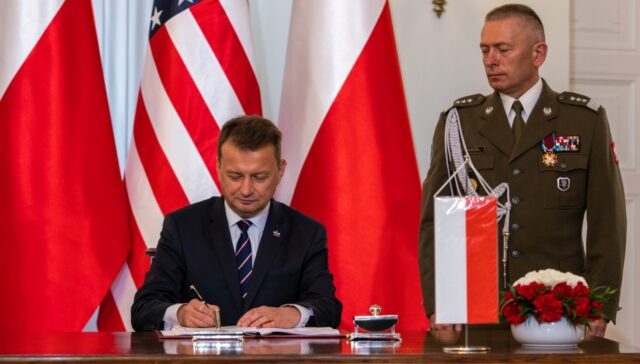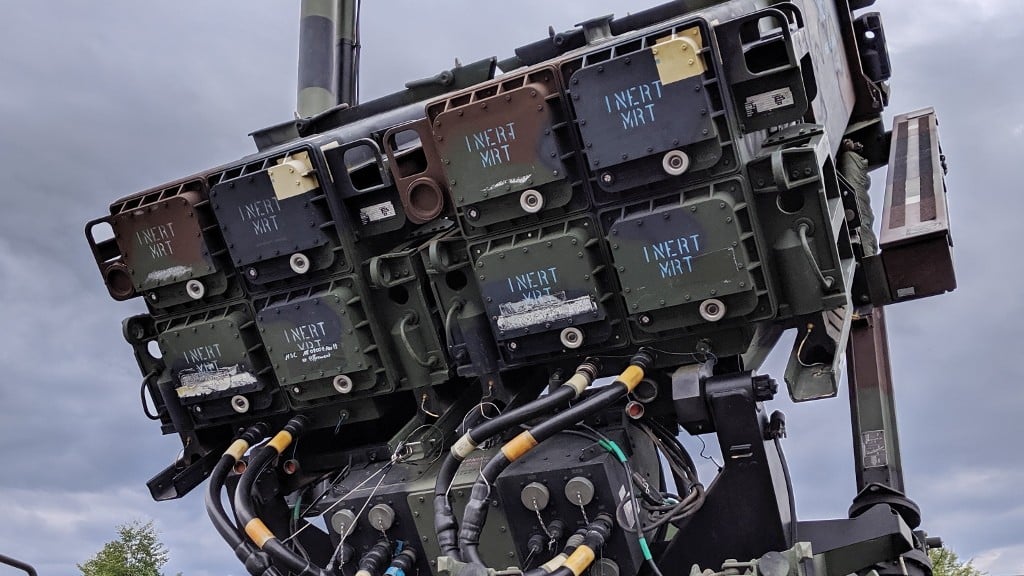If something is too good to be true, it probably isn’t true. Everything indicates that this rule is confirmed by the collapse of the plan to deploy German Patriot batteries in Poland to defend the airspace of our country. Writing about this case two days ago, we rejoiced that there was a mutual political will and that the word would soon become flesh. We must admit that we have shown reprehensible naivety about the realities existing in our country and in the one-man PiS politburo.
Yesterday, Mariusz Błaszczak torpedoed the whole plan, requesting that the Patriots be handed over (sic!) to Ukraine. The suddenness and perfidy of this maneuver, as well as its openly anti-German dimension, radically contrasting with the earlier enthusiasm shown by the head of the defense ministry, leads to the assumption that it happened on a more or less explicit order from above, and that Błaszczak has the upper hand in the ruling party only one man. At least not prime minister.
After more missile attacks 🇷🇺, I turned to the 🇩🇪 website to have the proposed 🇵🇱 Patriot batteries transferred to 🇺🇦 and set up at the western border. This will protect 🇺🇦 from further victims and blackout and increase security at our eastern border
— Mariusz Blaszczak (@mblaszczak) November 23, 2022
Someone will ask: what is the problem and where is the perfidy here, if Poland wants to support an ally who is at war? So let’s disassemble Błaszczak’s declaration into prime factors. First of all, the minister of battery deployment did the handover. The Germans wanted to station Patriots in Poland to defend an allied country, but the batteries were to be manned by German anti-aircraft guns and remain the property of the federal government, in the same way that two batteries are currently stationed in Slovakia.
Berlin would then have to agree to simply give Ukraine two Patriot batteries as military aid. Which theoretically could and could be agreed, but readers will want to notice what condition the minister has set. The batteries would be “placed at the western border” of Ukraine, so that they would also defend the Polish sky. So Ukraine would not even have the right to freely dispose of the weapons it receives from its allies. Yes, it is normal to impose various restrictions on arms deliveries (in the context of Ukraine, the most famous is the issue of what can and cannot be thrashed with GMLRS missiles), but if Ukraine already had its own Patriots, it would be unethical to expect that part of their considerable potential would be abandoned to defend Poland.

Mariusz Błaszczak and Lieutenant General Krzysztof Król.
(U.S. State Department / Ron Przysucha)
And let there be no ambiguity: Patriots standing in Poland could support Ukraine. As we wrote two days ago, depending on where exactly the radar stations would be located, they could provide the Ukrainian air defense with data about potential targets in Ukrainian airspace. It wouldn’t do any harm to defend our skies.
Speaking of the GMLRS: the Patriot is also an American-made weapon. The Germans can dispose of their systems as they wish, as long as they are their systems. However, the manufacturer would have to agree to re-export to Ukraine. In addition, there is the issue of training hypothetical Ukrainian anti-aircraft guns, which means a further delay of at least several months (the Patriot is a terribly complicated toy). And Ukraine needs support now, literally yesterday, because if the Russian campaign is successful, thousands of people will face death from hypothermia. Even marginal support provided by radars stationed in Poland, but provided soon, is now more valuable than greater support provided in February or March 2023.
There is a race against time in Ukraine. According to the Ukrainian authorities, yesterday “Kiev, Vinnytsia, Lviv, Zaporozhye, Mykolaiv, Poltava, Odessa and Khmelnytsky districts were completely or partially cut off from electricity. In many cities, water and heating supplies are also suspended, the Internet is not working, mobile communication is out of order.
However, the Germans simply do not want to part with their Patriots. Anyway, it’s hardly surprising. And it is also difficult to assume that Błaszczak did not understand how his counterproposal differs from Berlin’s initial offer. Could it be that the defense minister of a NATO member country demanded that another NATO member state join the war in Ukraine as an active participant in military operations?
3. Deliveries of anti-aircraft equipment helped a lot. 🇺🇦 downed 77 missiles, 10 Iranian drones, 1 Russian Orion and 1 Orlan.
4. Despite this, about 7 million users lost electricity. The worst situation is in the central circuits, where power outages have become the norm. pic.twitter.com/Xi5t69NfWZ— Maciej Zaniewicz (@MaciejZaniewicz) November 16, 2022
Voices of apologists can already be heard that the Germans did not really want to send their batteries to Poland and only pretended to be good allies. It is possible – Germany’s position on the war in Ukraine has been ambiguous from the beginning, it is clear that two camps clash there (the leaders of the pro-Ukrainian one are the Minister of Economy Robert Habeck and the Minister of Foreign Affairs Annalena Baerbock), and Chancellor Olaf Scholz is unable to pull the leash off the entire company.
But in such a situation it was necessary to let the Germans discredit themselves. Invite them politely, even let them choose their own locations, and then lament every two days that the Patriots aren’t here yet. In Slovakia, the deployment of a mixed Dutch-German OPL battalion took about a month. Delegating a contingent from one country, and with the help of the experience gained in the Slovak operation, would take less time.
Could the words of Jarosław Kaczyński, which we quoted in the previous article, still apply? The president of the ruling party stated eight years ago: “I wouldn’t want German troops on Polish territory. At least seven generations must pass before this is acceptable.” In Błaszczak’s volte, it is easy to see the finger of his principal. After all, Maria Konopnicka already wrote: Germany will not defend our sky or protect our children from Muscovite cruise missiles.
Accepting and implementing the German proposal would mean an improvement in the security of Poles living near the border with Ukraine. It may not even be a radical improvement in security, but it would certainly be a realistic attitude. Unfortunately, short-sighted prejudices – perhaps even just one man, certainly a small group of people – and short-term political games again turned out to be more important than the good of the homeland. And pulling such a stunt under the guise of concern for Ukraine does not deserve a cultural commentary.
See also: Liberian cannibal and war criminal Kunti Kamara on trial in Paris
Boevaya mashina, Creative Commons Attribution-Share Alike 4.0 International

